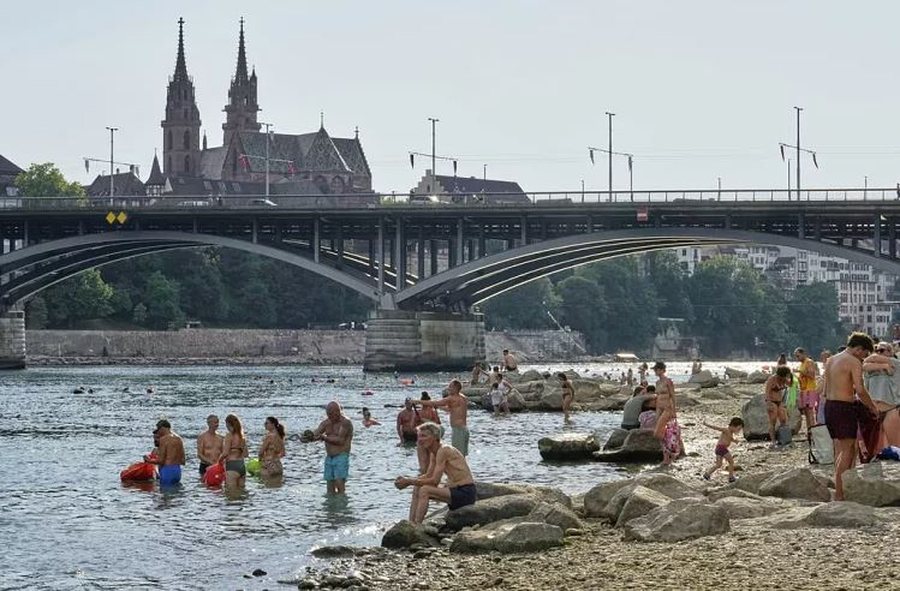
A continuing heatwave has broken records and raised alarms across Europe, as temperatures reach over 40 degrees Celsius in some parts of the continent.
Heat waves aren't just a nuisance that can be dealt with with ice water, a fan, and air conditioning. They're one of the most deadly and disturbing meteorological phenomena.
In Europe, extreme heat causes around 175,000 premature deaths each year, according to data from the World Health Organization, with a steadily increasing trend. The summer of 2023 saw a record number of heat-related deaths, with over 61,000 fatalities in the European continent alone.
ITALY
Experts say the most extreme heat is expected in Italy and southern Europe on Friday. Italy's health ministry said 17 of the country's 27 major cities were experiencing a heatwave. Earlier in the week, at least two people died.
Bolzano, in northern Italy, is facing increasingly frequent heat waves with temperatures reaching around 37 degrees Celsius.
The city's location in a valley, combined with its extensive asphalt and limited green space, has intensified the heat. Conditions are even more severe in the industrial zone, where hot southern winds bring additional heat to the area.
Authorities say expanding urban greenery is key to lowering temperatures. Shady areas can be up to five degrees cooler. Bolzano currently has about 13,000 trees and plants 250 more each year under a municipal greening plan. However, climate experts say thousands more are needed to have a significant cooling effect.
Urban infrastructure, such as underground fiber optic cables and district heating systems, limit where trees can be planted. In denser parts of the city, officials say artificial shading, such as awnings, can help mitigate heat exposure.
TurKEy
Extreme weather has sparked wildfires in Turkey that have claimed the life of an 81-year-old man. Hundreds of firefighters, backed by planes and helicopters, deployed on Thursday to extinguish a huge blaze that broke out in the Turkish coastal town of Cesme.
An 81-year-old man died from smoke inhalation, according to the provincial governor, while a total of 37 people were evacuated by emergency crews.
Turkey has been battling hundreds of wildfires across the country over the past week, fueled by strong winds, scorching heat and low humidity. The fires, most of which are now extinguished, led to the evacuation of tens of thousands of people.
Austria
Extreme heat continued in Austria on Thursday, with maximum temperatures reaching 38 degrees Celsius. In Salzburg, tourists sought relief from the heat in the city center, where sprinkler systems provided brief cooling in some areas.
The heatwave has exposed shortcomings in urban planning, especially in densely built-up areas with little greenery. Large expanses of concrete and a lack of shade have made some parts of the city particularly difficult to cope with.
The number of hot days in Salzburg, defined as those exceeding 30°C, has doubled in recent decades, increasing from around 10 to almost 20 days per year.
The heat and drought have also increased the risk of forest fires. Several fires have been reported in Austria.
Authorities are taking preventive measures such as monitoring humidity levels and checking agricultural machinery by clearing them of dry debris to reduce the risk of ignition.
Switzerland
In the Swiss canton of Aargau, the Beznau nuclear power plant was partially disconnected from the power grid due to persistent heat waves. One reactor was completely shut down, while the second operated at 50% capacity.
The plant operator, Axpo, said the reason for the closure was the high water temperature of the Aare River.
By closing the power plant, they hope to protect the flora and fauna in the river from excessive pollution. Discharging its hot water into the nearby, already overheated river would have endangered wildlife.
According to a 2024 report from the EU's Copernicus Climate Change Service, Europe is the continent with the fastest-growing temperatures on Earth, warming twice as fast as the global average since the 1980s. (A2 Televizion)











